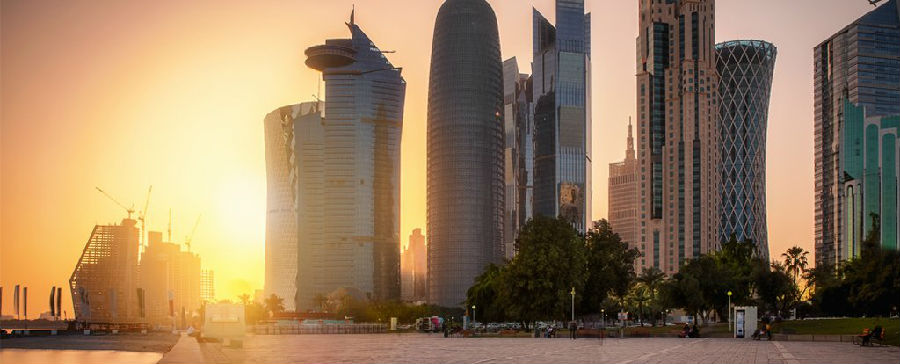(单词翻译:单击)
It's hot in the Middle Eastern nation of Qatar. Like, really hot.
中东国家卡塔尔天气炎热,是真的很热。
On summer nights, temperatures rarely dip below 32 degrees Celsius (that's 90 degrees Fahrenheit), and during the day they can soar upwards of 48 degrees Celsius (120 degrees Fahrenheit).
在夏日的夜晚,其气温很少有低于32摄氏度(90华氏度)的时候,而在白天,其气温可飙升至48摄氏度(120华氏度)。
In response, the nation has done something that sounds absurd: it's started to air condition its outdoor spaces - a "solution" which, ultimately, could exacerbate the sweltering heat.
为了抵抗酷暑,这个国家做了一件听起来很荒谬的事:它开始在室外装空调,而该“解决方案”最终可能会加剧酷热。
A fascinating story by The Washington Post dives deep into Qatar's temperature woes, noting how the extreme heat has put the health of the nation's residents at risk. In response, it has installed air conditioning units in its open-air sports stadiums, malls, and markets.
《华盛顿邮报》的一篇精彩报道深入探讨了卡塔尔的气温问题,它指出极端高温已使该国居民处于健康风险之中。为了抵抗酷暑,该国在露天体育场、商场和市场中安装了空调设备。
"If you turn off air conditioners, it will be unbearable," Yousef al-Horr, founder of the sustainability-focused Gulf Organization for Research and Development, told the Post. "You cannot function effectively."
“如果你关掉空调,炎热的环境将不堪忍受,你也无法有效地工作,”专注于可持续发展的海湾研发组织创始人约瑟夫·奥尔告诉《华盛顿邮报》。

The air conditioners might work to temporarily cool Qatar's residents, but they're an environmental catch-22: the nation uses fossil fuels to generate the electricity needed to run the devices.
这些空调或许可以暂时为卡塔尔居民降温,但它们本身就是难以解决的环境问题:该国使用化石燃料来获取运行这些设备所需的电力。
Those fossil fuels, in turn, produce carbon emissions, which contribute to the global warming that's cooking its public spaces.
而这些化石燃料又产生了碳排放,加剧全球变暖,破坏公共场所。
While signatories of the Paris Agreement agreed to attempt to avoid letting temperatures rise to 2 degrees Celsius (3.6 degrees Fahrenheit) above pre-industrial levels, Qatar has already exceeded that threshold - meaning the nation's current situation could foreshadow our future one.
尽管《巴黎协定》的签署国同意尽量避免使气温上升至比工业化以前的水平还高2摄氏度(3.6华氏度),但卡塔尔已经超过了这一界限,这意味着该国的现状可能预示着我们未来的状况。
"Qatar is one of the fastest warming areas of the world, at least outside of the Arctic," Berkeley Earth climate data scientist Zeke Hausfather told The Washington Post.
伯克利地球气候数据科学家泽克·豪萨泽尔在接受《华盛顿邮报》采访时表示,“卡塔尔是世界上最快变暖的地区之一,至少在北极以外是这样的。”
"Changes there can help give us a sense of what the rest of the world can expect if we do not take action to reduce our greenhouse gas emissions."
“如果我们不采取行动减少温室气体排放,那里的变化或许可以帮我们预期世界其他地方未来的样子。”


